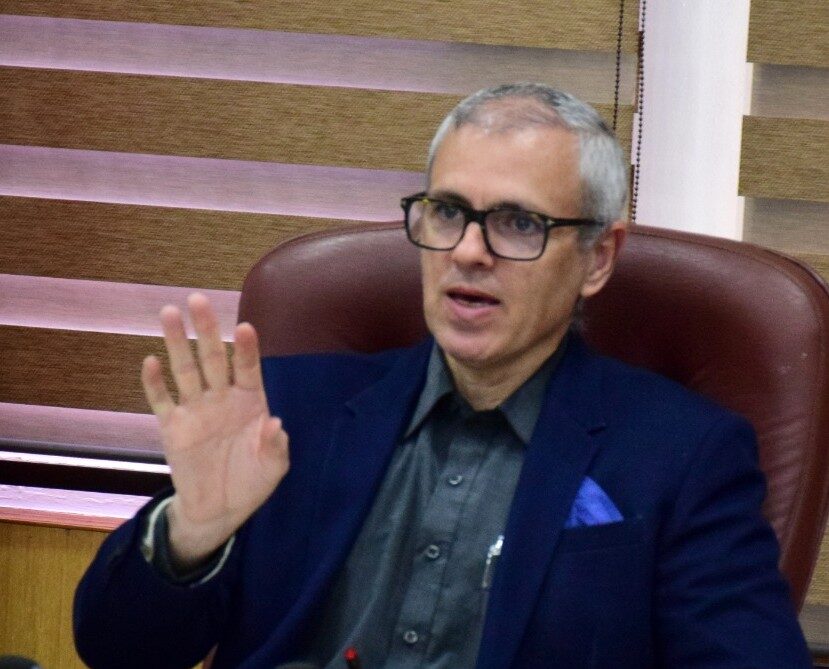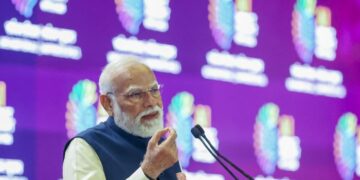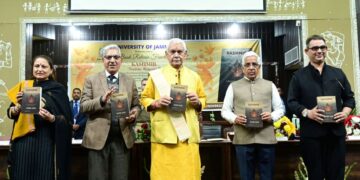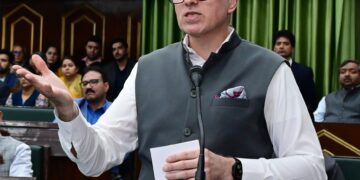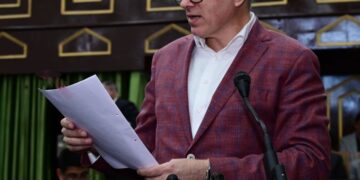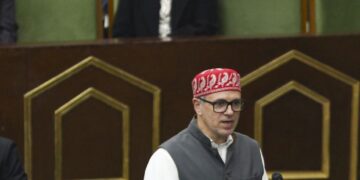Says ‘restoration of statehood not a concession but essential course correction’
Srinagar: Chief Minister Omar Abdullah has written to the presidents of 42 political parties, including Congress chief Mallikarjun Kharge, urging them to press the Centre to bring a legislation in the ongoing Parliament session to restore statehood to Jammu and Kashmir, saying it must not be viewed as a concession, but as an essential course correction, officials said on Tuesday.
According to the officials in the know, the chief minister termed it as an issue that goes beyond regional interests and touches the very core of the country’s Constitutional values and democratic ethos.
He said that downgrading a state to a Union Territory sets a “profound and unsettling” precedent and is a “constitutional red line” that “must never be crossed”.
“The act of reducing Jammu and Kashmir from a state to a Union territory in 2019 and the prolonged delay in restoring its status as a full state… has profound implications for the future of Indian polity,” the three-page letter written on July 29 said.
The chief minister said the reorganisation of Jammu and Kashmir into a Union Territory in August 2019 was presented as a “temporary and transitional measure” and cited repeated public assurances from Prime Minister Narendra Modi, including a promise made in Kashmir earlier this year that he called “Modi ka Wada.”
Abdullah also cited the stand of the Centre before the Supreme Court reaffirming its commitment to restore statehood at the earliest.
However, Abdullah argued that the “interpretation of terms like ‘at the earliest’ or ‘as soon as possible’ cannot stretch into years or decades.
The people of Jammu and Kashmir have already waited long enough—statehood must be restored now.”
According to the letter, Abdullah argued that the moral premise behind the removal of Article 370 was based on the “argument of equality,” but that this principle has not been applied equally.
“The denial of statehood is not something that has been imposed on any other region in India; in fact, the historical trajectory has always been from Union Territory to State, not the reverse,” the letter said.
He called the “prolonged and unprecedented disempowerment” of the people of Jammu and Kashmir “unjust” and said it “undermines the very rationale that was invoked to justify the changes of August 2019.”
Abdullah urged the political parties to press the Centre to bring in legislation in the current session of Parliament to restore the statehood in Jammu and Kashmir.
“The restoration must not be viewed as a concession, but as an essential course correction —one that prevents us from sliding down a dangerous and slippery slope where the statehood of our constituent states is no longer regarded as a foundational and sacred constitutional right but reduced instead to a discretionary favour bestowed at the will of the Central Government,” the letter said.
The chief minister said anything less would undermine the very idea of India and a departure from the vision of the founding fathers who framed a Constitution rooted in federalism, dignity and democratic self-governance.
The chief minister highlighted the “remarkable and enthusiastic participation” of the people of Jammu and Kashmir in last year’s assembly elections, and said that they turned out in “record numbers” and demonstrated an “unshaken faith in our constitutional processes and democratic institutions”.
In a “respectful acknowledgement” of this, his government’s first act was to pass a unanimous resolution calling for the immediate restoration of statehood.
Abdullah said he personally handed this resolution to the Prime Minister and was “assured that statehood would be restored.”
However, he lamented that “more than nine months have passed, and yet there is no clarity, timeline, or visible progress toward fulfilling that solemn assurance”.
The chief minister’s letter warned that the “temporary” status is beginning to “appear more as a convenient alibi than a genuine commitment,” serving as a “proverbial fig leaf” for an “indefensible act”.
He said that the six-year persistence of this status is “far beyond what any reasonable interpretation of the word might allow” and that an arrangement “meant to be transitional cannot be allowed to harden into permanence”.
Abdullah pointed to two recent events as “extraordinary opportunities to heal historical wounds and reinforce national unity”: the high voter turnout in the recent elections and the public condemnation of terror following an incident at Pahalgam.
“To allow such moments to pass — unacknowledged or unreciprocated due to narrow partisan calculations, will, without doubt, be a monumental mistake,” the chief minister cautioned and quoted famous poet Muzaffar Razmi Kairanavi: “Lamhon ne khata ki thi, sadiyon ne saza payi (Moments committed the mistake, centuries got the punishment)”.
He reiterated that the restoration of statehood is a matter of upholding the Constitution’s federal character, which is a “foundational feature” and said downgrading a state to a Union Territory sets a “profound and unsettling” precedent and is a “constitutional red line” that “must never be crossed.”
Abdullah’s letter also stated that “Jammu and Kashmir has faced extraordinary challenges due to its unique historical and geopolitical circumstances. Yet, despite these, it functioned as a resilient and striving state within the Union of India – surmounting difficulties that few other regions have had to endure.
He said instead of being further empowered and supported in that journey, it was unprecedentedly downgraded to a Union Territory.
“What has replaced the state is a structurally imbalanced and dysfunctional arrangement — a Union Territory with a legislature, but without the genuine authority or autonomy required to govern effectively.
“To invite citizens to vote in an election, while designing a governance framework in which the elected government is systematically obstructed by the Centre’s representatives — who wield overriding control over the implementation machinery — is to undermine the very spirit of democratic self-governance”, he claimed, adding elections lose their meaning if the government chosen by the people is disempowered.
Abdullah said the people of J&K are waiting eagerly for the restoration of their statehood.
“I would reiterate that the restoration of statehood – and with it, the full constitutional and democratic rights of the people – is important not only for J&K but also vital for upholding the federal and democratic character of our Constitution,” he said.

